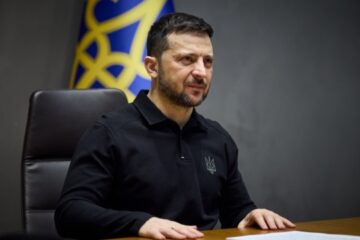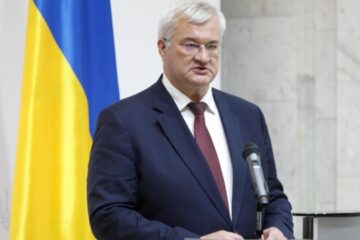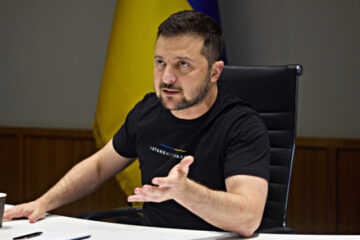Alle Dorhout has been leading the Embassy of the Kingdom of the Netherlands in Ukraine since this summer. A historian who studied the history of Eastern Europe, he also at one time headed the Intelligence Directorate at the General Intelligence and Security Service of the Ministry of Internal Affairs, so his academic and career background gives the experienced diplomat an understanding of the dynamic geopolitical shifts that Russia’s war against Ukraine has brought to Europe.
The ambassador spoke with Ukrinform late last week, telling about his vision of the Netherlands’ role in international support for Ukraine and focusing on the specifics of the challenging path to EU membership, the objective shortcomings of the international sanctions regime against Russia and the nuances of freezing Russian assets, the importance of international law and achieving the goals of holding war crime perpetrators accountable. The diplomat also shared his opinion on the best security guarantee for Ukraine and on the changing public discourse in Europe regarding the urgent threats to the continent’s security posed by Russia.
[embedded content]
NEARLY EUR 6 BILLION IN MILITARY AID IS STILL IN THE PIPELINE
– A lot to discuss, ambassador, a lot of things have been going on lately – bilateral relations, international situation, NATO, the European Union, and so on. First of all, defense assistance. The Netherlands has already provided Ukraine with over €3.76 billion in military assistance, including Patriots, armored vehicles, artillery, and F-16s. Is there discussion underway of donating more air defense capabilities, additional fighter jets, or other modern firepower?
– Yes, the Netherlands has been supporting Ukraine for the last three years in many ways, morally, humanitarian aid, reconstruction, economically, but also military aid, and indeed, EUR 3.8 billion has been delivered so far, but there is another six billion in the pipeline. So the Netherlands has committed more than EUR 10 billion in military aid, of which almost four has been delivered.
ENERGY IS ONE OF OUR PRIORITIES IN HELPING UKRAINE
– The Dutch Minister of Defense stated that supporting Ukraine is our common responsibility. How does the Netherlands see the role of its country and the entire EU in ensuring the long-term security of Ukraine, especially after the hot phase of the war is over?
We are in here together with Ukraine, it’s not just the interest of Ukraine, it’s also European interest
– We have always said that this is a common struggle, we are in here together with Ukraine, it’s not just the interest of Ukraine, it’s also European interest to defend its security, to defend its prosperity, to defend its values, and therefore the EU accession process is so very important. The treaty on the European Union also has a provision for security. So the EU accession process is not just about the internal market. It’s also about security. When the war is over, of course, the EU is into a long-term relationship with Ukraine, and I suspect that everything the EU and its member states are doing now in providing military aid to Ukraine will shift partly towards economic support, reconstruction, etc.
– Speaking of reconstruction. The Netherlands recently announced the allocation of EUR 209.5 million for the restoration of Ukraine’s critical infrastructure, including EUR 45 million for the Energy Support Fund. Are there plans to expand such initiatives in the future?
– We have energy as one of the priorities of the Netherlands in Ukraine, and we’ve done a lot so far to support Ukraine. And we’re constantly looking for new opportunities. And as we speak, we are in touch with Ukrainian counterparts to see what we can do extra to help Ukraine come through this winter.
ZELENSKY’S PEACE FORMULA IS A CREDIBLE INSTRUMENT TO COME TO PEACE
– The Netherlands actively supports President Zelensky’s Peace Formula, having signed the Peace Summit declaration in June 2024 confirming commitment to the territorial integrity of Ukraine, the release of prisoners of war, and guarantees of nuclear and food security. How does the Netherlands plan to continue supporting the initiative? What specific mechanisms can be implemented to achieve the goals of the Peace Formula?
– The Netherlands still thinks that the Peace Formula of your president is a very credible instrument to come to peace, and we are actively participating in working groups under the Peace Formula. We are the lead nation, together with Ukraine, on Point 7 of the Peace Formula, which is on accountability.
We believe that these working groups are very helpful in working towards a common goal, and that’s a sovereign Ukraine, independent Ukraine, and Ukraine with territorial Integrity.
– Along with the Peace Formula, alternative “peace initiatives” are emerging, for example from China and Brazil, which do not envisage the full restoration of Ukraine’s territorial integrity. How do you assess such proposals?
The Netherlands, as you know, is the legal capital of the world, which is in The Hague, and for us, international law is of the utmost importance
– As of the 24th of February 2022, we stepped in here to be side by side with Ukraine. And the fight, as far as we are concerned, has always been about territorial Integrity, about sovereignty, and about the restoration of international law, and the upkeeping of international law. The Netherlands, as you know, is the legal capital of the world, which is in The Hague, and for us, international law is of the utmost importance.
Russian aggression should not pay off. So whatever compromise Ukraine would like to do in whatever future negotiations, that’s up to Ukraine, to the Ukrainian people, but we are very clear standing by Ukraine in what it wants.
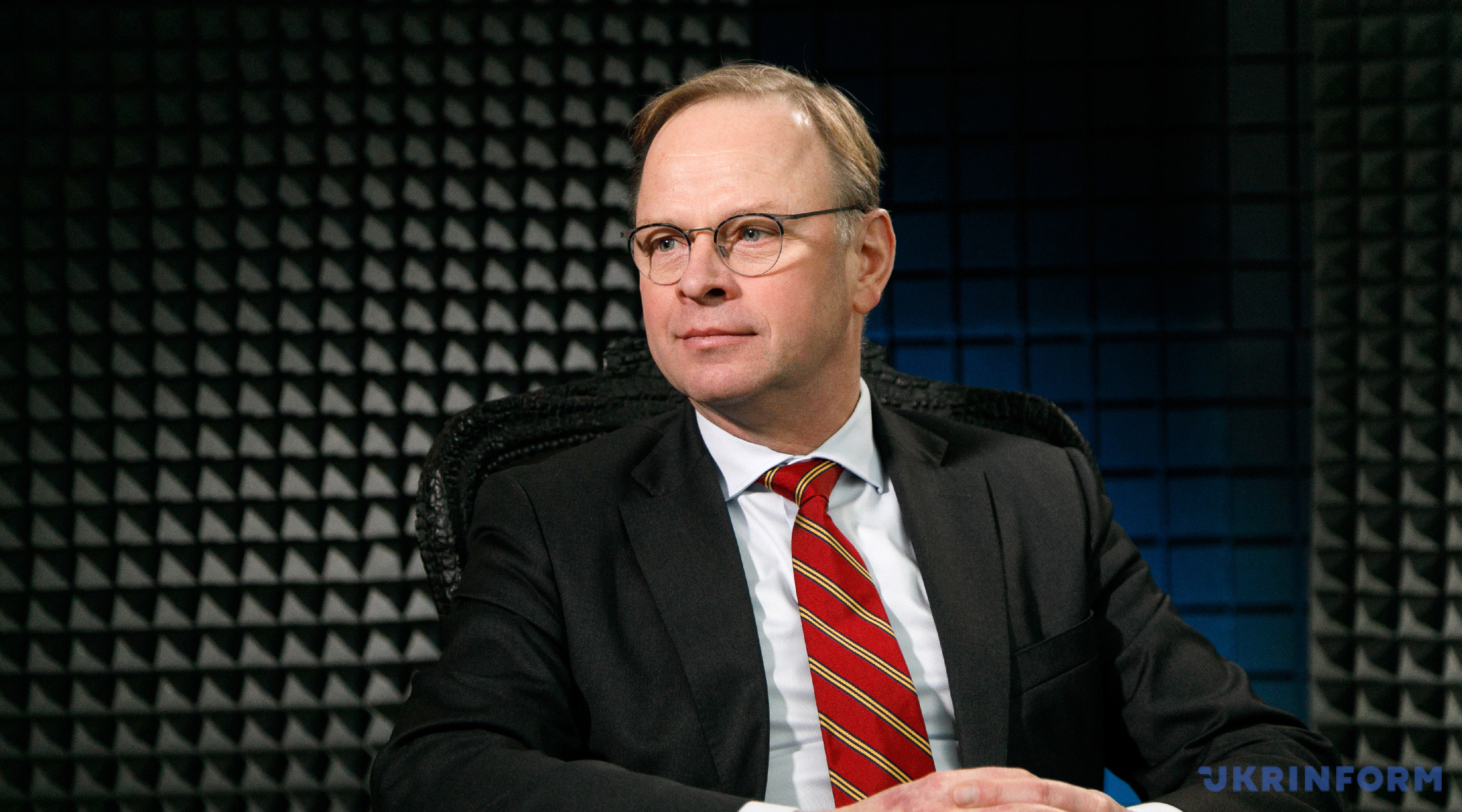
NATO MEMBERSHIP IS THE BEST SECURITY GUARANTEE FOR UKRAINE
– Any peace settlement, any negotiation that leads to peace eventually, implies for Ukrainians, in our understanding, future guarantees of our security. And it’s widely believed that Ukraine joining NATO is perhaps the most valid security guarantee for our country. There have been ideas circulating that rhere might be an option where Ukraine gets invited into NATO only within the government-controlled territories, excluding those that are temporarily occupied by Russia. What do you think of that? And what are generally the expectations of the NATO Summit in The Hague next year?
The Netherlands has always been very clear about Ukraine’s irreversible path to NATO
As you can also read in the newspapers, this is under discussion within NATO. And at this moment, not all NATO allies are yet on the same page. And this always happens within an international organization when important issues are at stake. This will be discussed among allies, and I suspect it will continue for the months to come, but it’s not the only discussion. There’s more happening, as you already said. There’s a lot of geopolitical dynamic, there are many discussions that are intertwined. So we’ll see what will come out of your conclusion that NATO membership is and should be the best security guarantee for Ukraine. That’s an opinion that we share in the Netherlands.
WHEN THERE’S NO CONSENSUS IN NATO, A COALITION OF THE WILLING COULD BE AN ALTERNATIVE
– A bit of a sideline from that question: currently we’ve been seeing initiatives voiced by different actors about a possibility of deploying some sort of international military mission to Ukraine as a sort of an intermediate guarantee for Ukraine to keep those contact lines stable while truce is in place. Do you think the idea is viable? Also, we heard that your defense minister said a consensus decision on this move might not be necessary for this, that maybe some powers could align and do that on their own? Do you have any stance on that?
– No, we don’t have a stance on that yet. But as you know, also looking back into history, there have been coalitions of the willing, and this could be something where a coalition of the willing member states or allies will step in because there has not yet been a unified position on this, and this is always an alternative when the alliance isn’t going to have a unified position on certain missions abroad. Coalition of the willing is always possible.
– As your foreign minister said, it’s too early to speculate on that…
– Well, it is indeed too early to speculate on that but the discussion is ongoing. Six months ago, President Macron of France put on the table the idea of “boots on the ground”. Since then, there has been a discussion internationally about boots on the ground, but it’s very difficult to speculate on this.
A LOT OF HARD WORK AHEAD ON THE PATH TO EU ACCESSION BUT PROGRESS IS IMPRESSIVE
– Another track that helps Ukraine see the future and maintain hope for the better is the EU accession. The Netherlands have always supported Ukraine on that path, and we do see some progress, as voiced by officials in Brussels. How do you see Ukraine’s progress on this path in terms of aligning our legislation and other reforms that are critical for meeting the expectations and the requirements set by the EU?
– I think the progress that has been made and also documented by the European Commission just early this month is impressive, as are the great efforts that the new Ukrainian government puts in it. The great commitment of the European Commission and EU member states, the president of the European Commission von der Leyen has been so vocal and supportive of Ukraine’s membership of the EU. This all helps very much. Also, when I talk to people in Ukraine, this is something that is massively supported by people at the national level, on the regional level, and even on the local level. It’s a topic that resonates everywhere.
Although the progress has been very impressive so far, from earlier experience, I know that the difficult work is yet to come. EE accession process is a very complicated process. It’s a long and winding road full of hard work, frustration, and disappointment. And it is important that we stay in this process together and the Netherlands has always been very strict on EU accession, but also is very willing to help Ukraine in its path towards the EU. Because we believe that the rightful place of Ukraine is within the European Union.
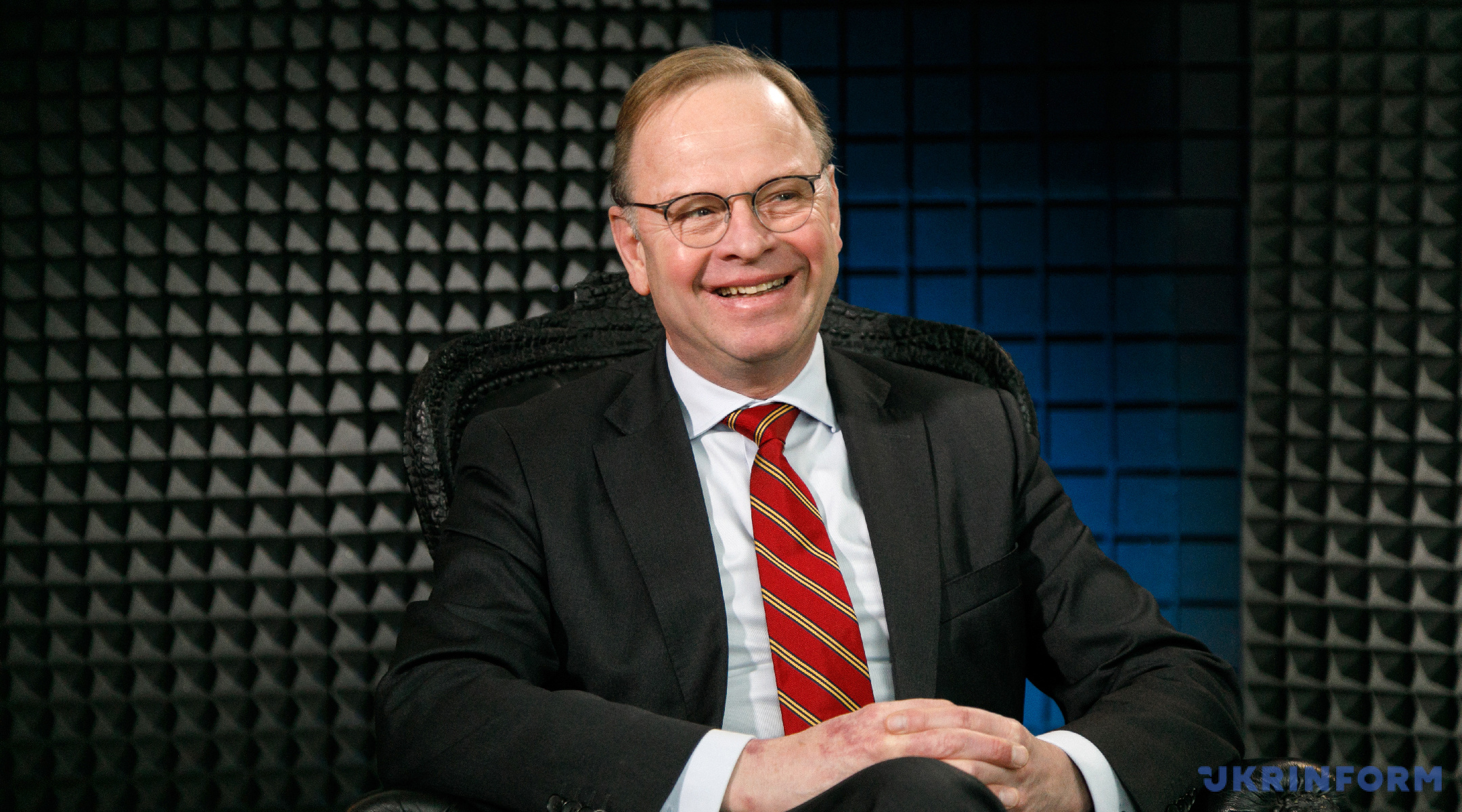
– A technical question. Are there any technical or expert support programs in plans to ensure our faster entry into the single trade market?
– Technical support is mainly coming from the European Commission. And European Commission is in the lead on behalf of the member states.
But the Netherlands is always looking into specific areas that are of importance to us, and we are also willing to provide technical expertise, technical assistance on the issues that are in the cluster of the fundamentals, that’s the one that will be open first. And that’s also the question that contains difficult issues, including reform of the judiciary, human rights, procurement, that sort of thing.
This is a very important topic to us. And therefore we also want to help Ukraine bring the implementation of EU legislation in order. And for us, for the Netherlands, at the end of the day, it’s the Copenhagen Criteria that must be fulfilled. And once that has been achieved, we can be sure that not only the EU is ready for Ukraine, but Ukraine is also ready for the EU.
– That will make Ukraine stronger, definitely.
– Yes, I believe so.
SANCTIONS CAN’T BE TOTALLY WATERTIGHT
– And while making Ukraine stronger, making Russia weaker at the same time contributes to bringing peace closer. How do you assess the current situation of international sanctions imposed on Russia? How really effective are they given that Russia keeps finding loopholes to evade them? Also they keep doing what they have been doing for years, which is industrial espionage. We’ve read about the case where a person was charged over spying for Russia while working at microchip companies in the Netherlands. What else can be done to prevent Russia from evading sanctions?
– First of all, it’s important to realize that sanctions is an instrument from the toolkit of foreign affairs. It’s just one instrument, it’s an important instrument, but it’s not watertight. It’s difficult to impose sanctions that are watertight. If not everybody is participating in this, and, for instance, as long as China will fuel Russia with products that it needs for its defense industry, there will be a big loophole in sanctions.
Nevertheless, the European Union has adopted the 15th package of sanctions recently, and I hope that under the Polish presidency, the 16th package of sanctions will see light as well. So we work on improving the sanctions again and again, but we realize they will never be watertight.
– What sectors of Russian economy you personally believe must be sanctioned as a priority?
– I’d say the defense industry. But again, it’s very difficult. The Russian alliances with North Korea with Iran, and very important economic relations between Russia and China are very difficult to close for the European Union and its partners.
A SOLID LEGAL BASE IS NEEDED TO FREEZE ASSETS
– Another thing that’s very important is frozen Russian assets. It’s of particular importance for Ukraine to use that money for reconstruction and other purposes. This fall, a report was published stating the large part of Russian assets kept in the Netherlands that had been initially frozen were eventually released because the owners of those companies formally distanced themselves from those assets. Is there any update on the fate of those assets?
– I don’t have the technical details. But the Netherlands has always been a very staunch supporter of freezing assets and also using the windfall profits of these assets to support Ukraine. That’s as good as we can do. Unlike in Russia, in the Netherlands the rule of law is very important. So, when you freeze assets, you need a very sound legal base. And if a judge finds that the legal base is not sound enough then unfortunately, we have to let go, or look for another way to freeze these assets.
This is also the consequence of living in a country where the rule of law is very important.
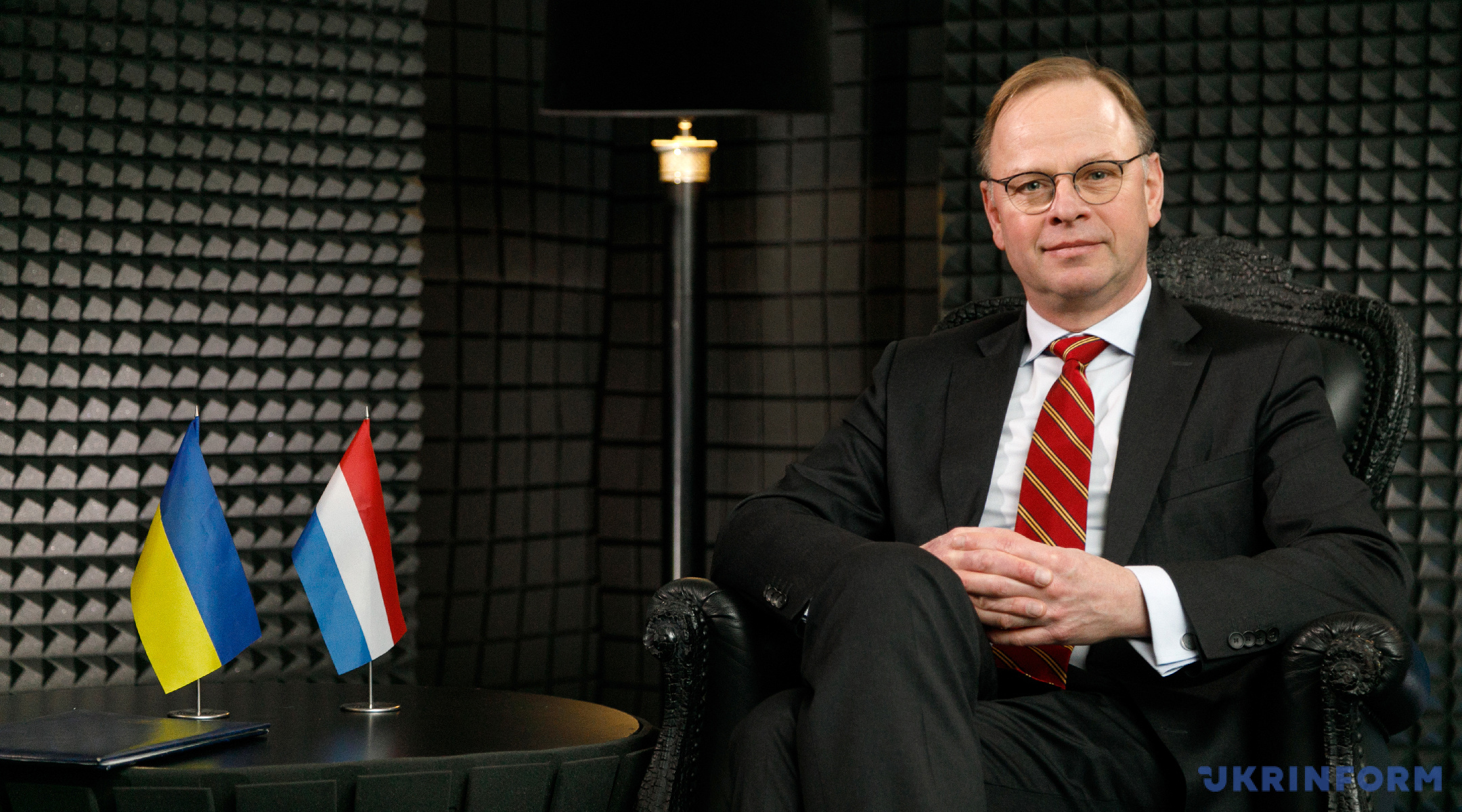
ISSUE OF BRINGING CHILDREN BACK SHOULD BE PART OF SETTLEMENT TALKS
– A question from the humanitarian field. The Netherlands is actively involved in the international coalition efforts to return children illegally deported by Russia, and has allocated EUR 2 million to support forensic research in Ukraine. Also the “Back 2 School… But Not for Them” awareness campaign was launched in the country, which draws international attention to the problem. What additional steps can the international community, including the Netherlands, take to bring those kids back home? Are new programs or measures planned for their reintegration and their rights’ protection in the post-war period?
– The abduction of children by Russia is one of the most repulsive criminal acts of this war so far. And, of course, these children belong to Ukraine, they belong to their parents, to their families. They need to be brought home. We all know that this is a very difficult situation, and I sincerely hope that as soon as it will come about ending the war, this will be a prominent part of these negotiations, because it will be, I think, the best way to get them out as soon as possible. That’s what we should always drive for.
– … And we’re coming back to the question of accountability.
For us, accountability is a real priority of what we do for Ukraine
– Absolutely, yes, as I said, the Netherlands not only has the legal capital of the world, we are also co-leader in a working group on Point 7 of the Peace Formula, on accountability. So for us, accountability is a real priority of what we do for Ukraine.
ATTACK ON UKRAINE’S CULTURAL HERITAGE IS AN ATTACK ON UKRAINIAN IDENTITY
– Another humanitarian question: culture, art. More than 2,100 cultural infrastructure sites have been damaged or destroyed. At one time, the return of the “Scythian gold” was made possible thanks to the efforts of the Netherlands and the decision of the Supreme Court, which confirmed the importance of international law and respect for Ukraine’s cultural heritage. How do you assess the significance of this precedent for the protection of cultural values in times of war? Is the Netherlands ready to support financing measures for the reconstruction and restoration of Ukrainian cultural heritage?
– Russian aggression against Ukrainian cultural heritage is something we have seen for the last couple of years, and it does worry us very much because it’s not just an attack on Ukrainian culture, but also on Ukrainian people and Ukrainian identity.
Therefore, the Netherlands has its own cultural program for Ukraine, which is tailor-made for supporting Ukrainian Ministry of Culture in protecting its own cultural heritage. And recently, we also supported the training for prosecutors from the Office of the Prosecutor General on how they can find information, how they can digitalize certain processes, and how they can be more active in the field of prosecuting crimes against cultural heritage.
EUROPE IS WAKING UP, BUT STRENTHENING DEFENSES COULD REQUIRE DIFFICULT POLITICAL CHOICES
– Now back to your professional career. Your experience as chief of the intelligence agency gives you a unique understanding of pressing security challenges. Given your expertise, what lessons from the current war could be useful for strengthening European security in general? Do you expect changes in the EU’s approaches to deterring aggression and combating new forms of hybrid threats?
– What’s happening in the world right now is we see major geopolitical dynamics. This is dynamics between the U.S. and China, dynamics between China and Russia, dynamics between Russia and Europe, including Ukraine. A lot is happening in the world. What I believe is that Europe should wake up and change some policies if it wants to remain a relevant player worldwide.
I should also say that Europe is waking up because we have within Europe this discussion about increasing the defense spending, about European defense industry, etc, so at the moment, Europe is waking up, but we still do not do enough to ensure our place in the globe order three years in. So this will take a lot of difficult political choices in European countries in the years to come.
– Unlike autocracies, any democracy depends on people’s view of things when making decisions, including on defense and security, and there’s a problem where politicians in Europe and in any democracy think four or five years ahead, until the next election cycle. Do you think the society in the Netherlands is getting to realize the modern threats that are facing their country, including, God forbid, a war, or even the current hybrid threats? Is there a shift?
– I think there is the beginning of a shift. And in a democracy – you’re totally right – it takes more time, because you can’t take difficult decisions without public support. But we have just seen this week that Mark Rutte, our former prime minister and strong supporter of Ukraine, who is now the Secretary General of NATO, made a statement, as NATO Secretary General, warning the populations of the NATO allies that they should prepare for difficult years to come. And that this will ask for difficult political choices.
And of course people have other issues on their minds as well. It’s not just security but also housing, education, etc. But what I see now in the public debate in the Netherlands is that security is increasing its importance. What I understand from this dynamic is that at least the Dutch media but with them also the Dutch population are more and more realizing that these difficult choices will have to be made, and that security is a very important issue.
Ievgen Matiushenko, Kyiv
Photo: Kyrylo Chubotin
Source: Ambassador of the Netherlands to Ukraine Alle Dorhout


